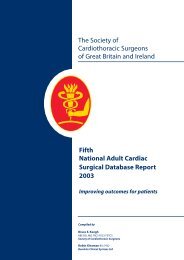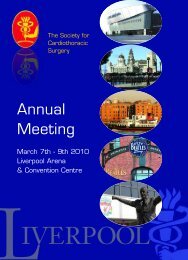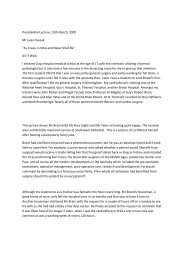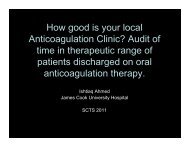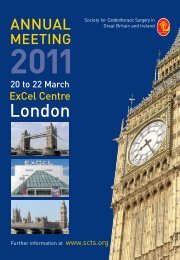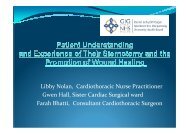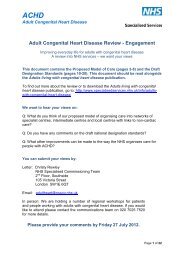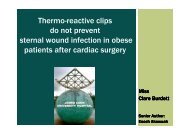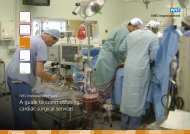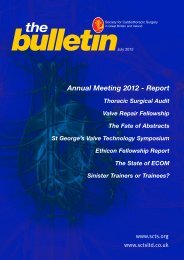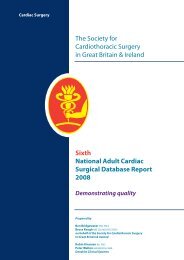Download - Society for Cardiothoracic Surgery
Download - Society for Cardiothoracic Surgery
Download - Society for Cardiothoracic Surgery
Create successful ePaper yourself
Turn your PDF publications into a flip-book with our unique Google optimized e-Paper software.
July 2010 21<br />
Ben Bridgewater<br />
On behalf of the<br />
SCTS Database<br />
Committee<br />
biological/mechanical valves <strong>for</strong> AVR, a<br />
propensity matched mitral<br />
repair/replacement study and analyses<br />
of on-pump/off pump and multiple<br />
arterial grafts <strong>for</strong> CABG surgery. We<br />
would hope that all of these projects will<br />
be completed this year and will be<br />
seeking wider input from the<br />
membership to contributions to the<br />
manuscripts. We are also looking to<br />
instigate projects to in<strong>for</strong>m and support<br />
TAVI programmes.<br />
We have also been successful in securing<br />
funding from Heart Research UK <strong>for</strong> an<br />
analyst to support the SCTS database<br />
agenda, and we are in the process of<br />
recruitment. It is planned that this<br />
analyst will pursue some themes under<br />
the direction of the SCTS database<br />
committee on behalf of the SCTS<br />
executive, which will include exploring<br />
and refining the methodologies <strong>for</strong><br />
analysing and presenting clinical<br />
outcomes data and linking SCTS data<br />
with other datasets (such as<br />
administrative data and other clinical<br />
datasets). We also intend to make a<br />
proportion of time available to support<br />
research proposals from members of the<br />
SCTS. We would like to hear expressions<br />
of interest from members who wish to<br />
conduct projects on the database, either<br />
utilising the SCTS analyst, or using their<br />
own expertise and resources. Further<br />
in<strong>for</strong>mation is available from Ben<br />
Bridgewater via sctsadmins@scts.org.<br />
Finally James Roxburgh has led a project<br />
to update the SCTS dataset, to account<br />
<strong>for</strong> limitations in the exiting dataset<br />
resulting from advances in clinical<br />
practice, some conflicts in the existing<br />
dataset, and the learning from the<br />
various analyses we have undertaken.<br />
The new dataset is available at<br />
www.scts.org. We plan to implement<br />
this dataset from April 1st 2011, and are<br />
in process of devising a change<br />
management strategy to support this.<br />
Further in<strong>for</strong>mation is available from<br />
James Roxburgh at<br />
James.roxburgh@gstt.nhs.uk.<br />
BSET Endovascular<br />
fellowship report<br />
The face of cardiovascular<br />
treatment is changing, and<br />
now more than ever the title<br />
of Michael Mack’s paper<br />
“Fool me once shame on<br />
you, fool me twice shame on<br />
me” rings loud in the ears of<br />
cardiac surgical trainees.<br />
Transcatheter Aortic Valve<br />
Implantation is growing<br />
exponentially, the treatments<br />
of thoracic aortic aneurysms<br />
and complicated type B dissection are now<br />
often endovascular in the first instance,<br />
and hybrid procedures are evolving to<br />
treat pathology in the aortic arch.<br />
Experience of these procedures are not<br />
easily accessed by the cardiothoracic<br />
trainee, nor are wire skills or techniques to<br />
provide the correct access or deal with the<br />
complications of peripheral vascular<br />
access at femoral , axillary or iliac level.<br />
Endovascular therapies cross the<br />
traditional speciality borders of cardiac<br />
surgery, cardiology, vascular surgery and<br />
interventional radiology. Hence funding <strong>for</strong><br />
training across different departments is<br />
difficult to achieve within a training<br />
programme.<br />
This is where the British <strong>Society</strong> of<br />
Endovascular Therapy (BSET) is<br />
exceptional. They have been generously<br />
supported by Cook Medical to provide 3<br />
endovascular fellowships which are open<br />
to applications from trainees across<br />
specialities. The applicants are<br />
predominantly from vascular surgery and<br />
are reasonably competitive (15 shortlisted<br />
<strong>for</strong> interview <strong>for</strong> 3 jobs), but applications<br />
from other specialities are encouraged and<br />
given a fair hearing.<br />
I was awarded one of the fellowships in<br />
2009 and spent the time at St Mary’s<br />
Hospital in London. I was based in the<br />
department of vascular surgery and<br />
worked on the vascular registrar on call<br />
rota which was an added extra in terms of<br />
learning opportunities available. The<br />
fellowship allowed me to spend time in<br />
theatre, the radiology angiography suite<br />
as well as in the cardiology catheter lab to<br />
experience a range of endovascular<br />
procedures. The department has a large<br />
workload and an international reputation<br />
in endovascular management of the whole<br />
Neil Roberts<br />
aorta. I gained experience in<br />
treatment of the thoracic and<br />
thoraco-abdominal aorta with<br />
open surgery, endografts,<br />
branch/fenestrated<br />
technology and hybrid surgery<br />
both of the arch and thoracoabdominal<br />
aorta. I also<br />
assisted in TAVI cases using<br />
Corevalve and the Edwards<br />
device, transfemoral and<br />
transapical. I attended the<br />
Endovascular and TAVI MDT<br />
meetings, discussing many cases each<br />
week which provided excellent training in<br />
what is possible, how to do it and most<br />
importantly of all how to plan an<br />
endovascular case safely.<br />
One of the most interesting parts of the<br />
fellowship has been to mix with both<br />
industry and endovascular innovators,<br />
learning not only about what is currently<br />
available, but also about future directions<br />
and products. It is not a question of if? but<br />
rather how soon? regarding an<br />
endovascular solution to the ascending<br />
aorta and arch. This sort of technology<br />
advance – a modular approach possibly<br />
combining transapical TAVI and branched<br />
TEVAR is not far away and I would hope<br />
our speciality is involved in this exciting<br />
field when the time comes.<br />
I would thoroughly recommend post exam<br />
cardiothoracic trainees with an<br />
endovascular interest to consider a BSET<br />
fellowship, further details are available at<br />
the BSET website www.bset.co.uk.<br />
I would be happy to be contacted by<br />
anyone thinking of applying <strong>for</strong> an<br />
endovascular fellowship in the future at<br />
the contact details below.<br />
The fellowship was prospectively<br />
approved by the deanery, cardiothoracic<br />
SAC and PMETB so <strong>for</strong> trainees wanting to<br />
undertake an endovascular fellowship in<br />
the future the precedent is set to count the<br />
time towards a cardiothoracic CCT should<br />
the individual wish to do so.<br />
Finally I would like to thank BSET and all<br />
the consultants at St Mary’s across the<br />
specialities who made me feel welcome<br />
and ensured I had an excellent fellowship.<br />
Neil Roberts neil.roberts3@gmail.com



